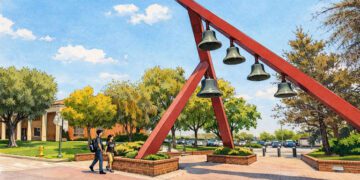Coming in on the heels of major bank failures Bank of America in Chicago had customers lined up – out the door and around the block Wednesday, March 30, with customers complaining money was missing from their accounts, including funds from Zelle deposits and transactions.
Rey Garcia told ABC13 that he has been with Bank of America for 20 years. “I was surprised, like, whoa,” Garcia said. “So I checked my transactions. I had 15 different Zelle transactions. That was, a red flag for me right there because I don’t remember doing all that in one day.” He said almost $700 went missing from his account. He called customer service with no luck getting a representative.
A Bank of America spokesman told ABC7 San Francisco that the problem had been resolved and the deposits and transfers are starting to appear in customers’ accounts. Wednesday morning, many customers took to social media to express frustration and try to find answers.
In hope of quelling any anxiety within the City of La Mirada, the Olive Grove reached out to City Manager Jeff Boynton, he replied:
“The City’s investment portfolio is reviewed and managed by a professional financial advisor in accordance with the City’s investment policy and applicable state and federal laws. The City’s investment policy is conservative and focuses primarily on safety and liquidity of assets, then yield. According to the policy, investments must be rated at least AAA and mature within five years. The City recently transferred a relatively small portion of restricted funds from its banking institution to the Local Agency Investment Fund (LAIF). This program offers cities the opportunity to participate in a major portfolio administered and invested by the State’s Treasurer’s Office at no additional cost. Sufficient fund balances remain in the City’s various checking accounts to meet daily cash flow obligations.”
Edward Jones released a statement March 15 saying:
“Volatility from the latest bank failures may make the market’s strong start to 2023 feel like a distant memory. While this is a new wrinkle in an old bear market, troubles in the banking sector should not be dismissed. They come at a precarious stage in which markets were already digesting the crosswinds of Federal Reserve rate hikes and emerging softness in the economy alongside persistent (and encouraging) strength in the labor market. That said, we don’t think this is the beginning of a financial crisis that sets a new, sustained course. We think financial market anxiety around the banking system will persist until the dust settles on deposit movements and funding uncertainties. This won’t, in our view, spill over into a more structural crisis across the industry. While additional niche or smaller lenders may approach a similar situation to what Silicon Valley Bank (SVB) has endured, we think forecasts of a banking sector collapse are overdone. The vast majority of the U.S. banking system is adequately capitalized to navigate this environment.
A Chamber of Commerce member who is in the banking industry and asked not to be named remarked:
The recent failures of Silicon Valley Bank and Signature Bank was a direct result of these specialty banks’ failure to invest or layer their deposits correctly; hence exposing their customers to extraordinary interest rate risk (the risk that assets prices would depreciate as interest rates rise). To make matters worse, the majority of Silicon Valley Bank’s funding sources (depositors) were tech-based companies and venture capital firms, not more stable, diversified customer base like other banks. The struggles of unprofitable technology firms and crypto-currencies and an aggressive rate hike environment created a perfect storm for banks like SVB and Signature Bank. While the current concerns surrounding the banking sector may raise worries about another 2008 financial crisis, the situation today seems to be very different. Given the fact that only a handful of smaller banks have been affected, it’s unlikely that this will spill into the broader economy. Relative to the global financial crisis of 2008, banks are in much better shape financially today.
BofA customers reported that when trying to place a call to customer service, they received a message that their call could not be completed due to “extenuating circumstances.” At one branch location in Houston, a line of more than a dozen customers waited for help, with several of them saying money was missing from their accounts. They’re telling ABC13 Houston that they’ve been told to call customer service, but they can’t get through to representatives on the phone, so they showed up in person.
Bank of America put a warning on its app, saying: “Please note: Zelle transactions made between January 14 and January 17 may be delayed in occurring and posting to accounts as requested. Transfers will be completed and will appear in your account activity and balances as soon as possible. We apologize for any delays or inconvenience.”
Because some are missing money that was sent through the in-app Zelle network, customers also tweeted at the Zelle help account. According to the “@ZelleSupport” account: “The Zelle app and network are up and running. As one of our partner banks, Bank of America is in full control of the Zelle feature in their app. We do not have access to the profiles, payments, or records of those associated with them.”
It should be noted that both Bank of America and Zelle have experienced a surge in fraud, with scammers tricking customers into sending them money via Zelle under the guise of “protecting” their funds at Bank of America.
The best course of action is not to panic and work closely with your financial advisor or planner through difficult periods like this, check your balances and accounts daily and immediately report any off transactions.
































